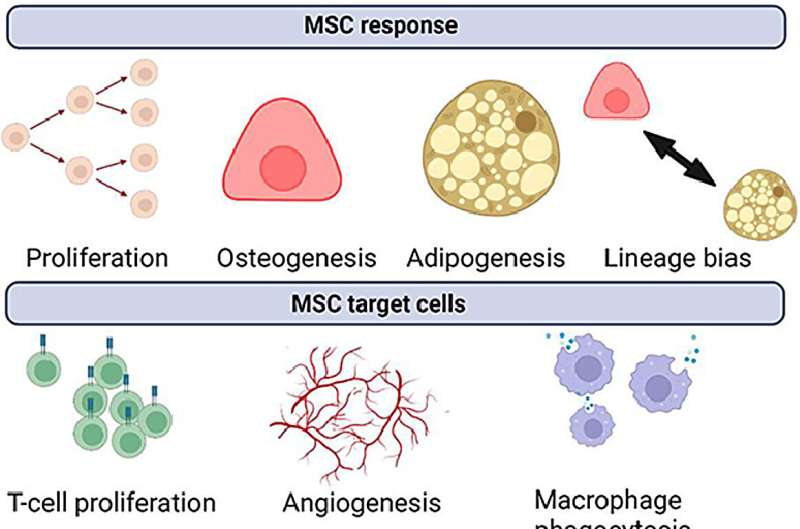This article has been reviewed according to Science X's editorial process and policies. Editors have highlighted the following attributes while ensuring the content's credibility:
fact-checked
peer-reviewed publication
trusted source
proofread
Healing cells could be 'tuned' in the test tube to target repair and regeneration work in the body

Engineering researchers at Monash University have found new evidence that special cells involved in tissue repair can be "tuned" to take on different types of repair and regeneration work in the body by modifying the physical environment in which they are grown in the laboratory.
Working with mesenchymal stromal cells (MSCs), a team led by Associate Professor Jess Frith of the Department of Materials Science and Engineering showed that the stiffness of the surface on which the cells are grown has an important influence on their properties and functions. The research is published in the journal Acta Biomaterialia.
MSCs are versatile cells that play multiple roles in healing and rebuilding tissues like bone, cartilage and even muscle. They can transform into various cell types to repair damaged tissues and also act as "medicine factories" producing many important biochemical factors that help in tissue repair and regeneration.
Because of their dual abilities to produce other cell types and promote healing, MSCs are being widely studied for their potential use in a broad range of conditions including osteoarthritis, coronary artery disease, graft-vs-host disease and diabetic wounds, to name just a few.
The new Monash research findings raise the exciting possibility that MSCs could be "tuned" in the laboratory so they are primed to meet specific clinical needs, said Associate Professor Frith.
"Our study found that physical cues from the microenvironment around these cells change the mix of proteins they secrete and hence the effects they produce," she explained.
"The cocktail of molecules produced in a stiffer biomaterial boosts the growth and proliferation of MSCs, whereas a softer gel supports their specialization into other cell types as well as the activity of immune cells and formation of new blood vessels."
The study also suggests the design of biomaterials such as prostheses can be more specifically tailored to support different activities and properties of MSCs after they are delivered into the body, she said.
More information: Aeolus Vilar et al, Substrate mechanical properties bias MSC paracrine activity and therapeutic potential, Acta Biomaterialia (2023). DOI: 10.1016/j.actbio.2023.06.041
Journal information: Acta Biomaterialia
Provided by Monash University





















